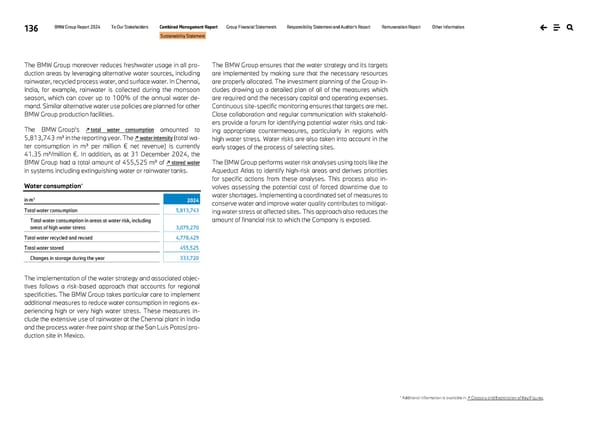136 BMW Group Report 2024 To Our Stakeholders Combined Management Report Group Financial Statements Responsibility Statement and Auditor’s Report Remuneration Report Other Information Sustainability Statement The BMW Group moreover reduces freshwater usage in all pro- duction areas by leveraging alternative water sources, including rainwater, recycled process water, and surface water. In Chennai, India, for example, rainwater is collected during the monsoon season, which can cover up to 100% of the annual water de- mand. Similar alternative water use policies are planned for other BMW Group production facilities. The BMW Group’s ↗ total water consumption amounted to 5,813,743 m³ in the reporting year. The ↗ water intensity (total wa- ter consumption in m³ per million € net revenue) is currently 41.35 m³/million €. In addition, as at 31 December 2024, the BMW Group had a total amount of 455,525 m³ of ↗ stored water in systems including extinguishing water or rainwater tanks. Water consumption* in m3 2024 Total water consumption 5,813,743 Total water consumption in areas at water risk, including areas of high water stress 3,079,270 Total water recycled and reused 4,778,429 Total water stored 455,525 Changes in storage during the year 333,720 The implementation of the water strategy and associated objec- tives follows a risk-based approach that accounts for regional specificities. The BMW Group takes particular care to implement additional measures to reduce water consumption in regions ex- periencing high or very high water stress. These measures in- clude the extensive use of rainwater at the Chennai plant in India and the process water-free paint shop at the San Luis Potosí pro- duction site in Mexico. The BMW Group ensures that the water strategy and its targets are implemented by making sure that the necessary resources are properly allocated. The investment planning of the Group in- cludes drawing up a detailed plan of all of the measures which are required and the necessary capital and operating expenses. Continuous site-specific monitoring ensures that targets are met. Close collaboration and regular communication with stakehold- ers provide a forum for identifying potential water risks and tak- ing appropriate countermeasures, particularly in regions with high water stress. Water risks are also taken into account in the early stages of the process of selecting sites. The BMW Group performs water risk analyses using tools like the Aqueduct Atlas to identify high-risk areas and derives priorities for specific actions from these analyses. This process also in- volves assessing the potential cost of forced downtime due to water shortages. Implementing a coordinated set of measures to conserve water and improve water quality contributes to mitigat- ing water stress at affected sites. This approach also reduces the amount of financial risk to which the Company is exposed. * Additional information is available in ↗ Glossary and Explanation of Key Figures.
 BMW Group Report 2024 Page 135 Page 137
BMW Group Report 2024 Page 135 Page 137